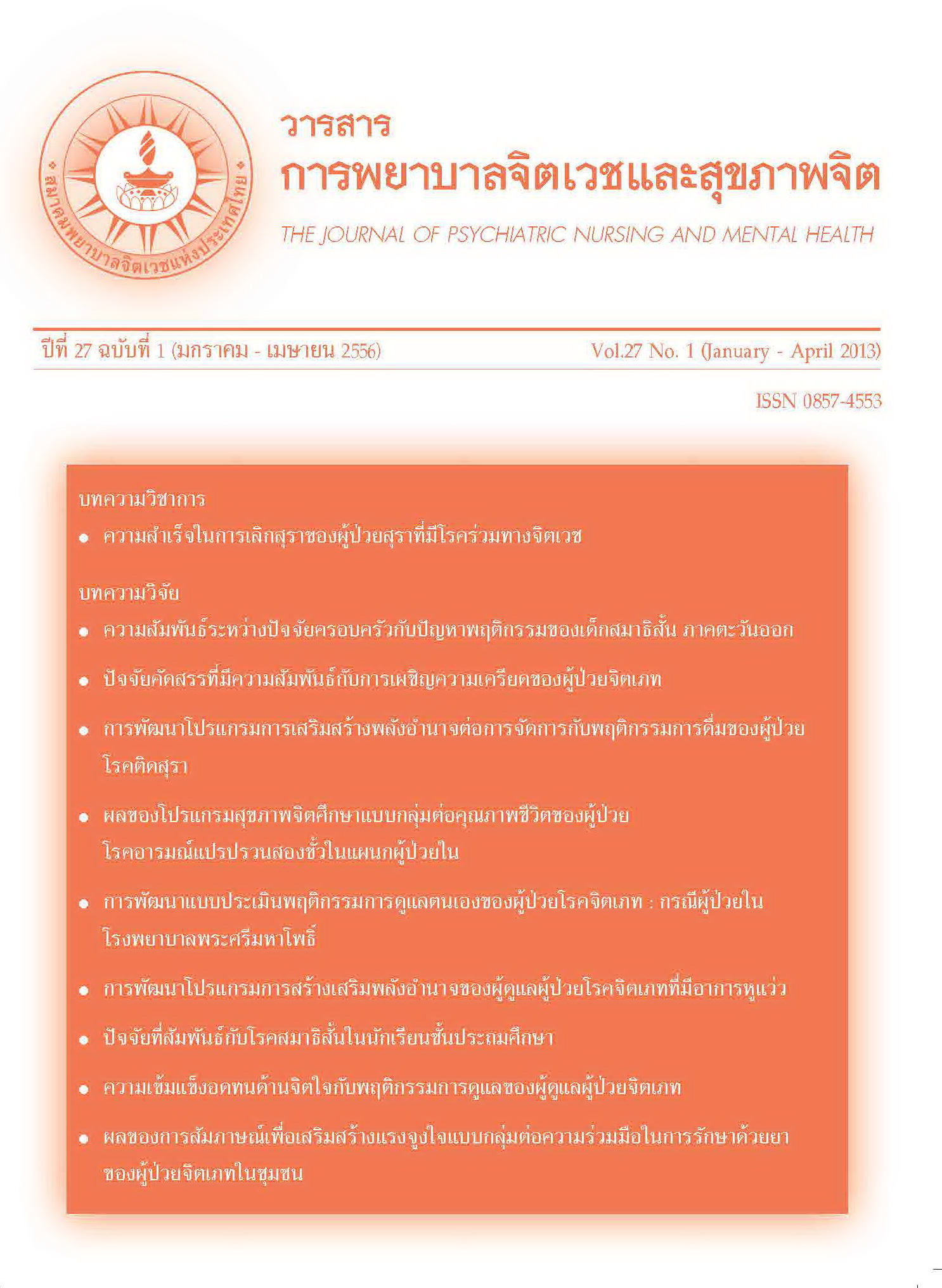ความสัมพันธ์ระหว่างปัจจัยครอบครัวกับปัญหาพฤติกรรมของเด็กสมาธิสั้น ภาคตะวันออก
Main Article Content
บทคัดย่อ
บทคัดย่อ
การวิจัยนี้เป็นการวิจัยเชิงบรรยายมีวัตถุประสงค์เพื่อศึกษา 1) ปัญหาพฤติกรรมของเด็กสมาธิสั้น 2) ความสัมพันธ์ระหว่างปัจจัยครอบครัวซึ่งประกอบด้วย ความเพียงพอของรายได้ ความสัมพันธ์ภายในครอบครัว ปัญหาทางจิตของพ่อแม่/ผู้ดูแล กิจวัตรสุขภาพครอบครัว และการปฏิบัติหน้าที่ของครอบครัวกับปัญหาพฤติกรรมของเด็กสมาธิสั้น กลุ่มตัวอย่าง คือ พ่อแม่หรือผู้ดูแลของเด็กสมาธิสั้นอายุ 6-12 ปี จำนวน 120 คนที่มารับบริการในแผนกผู้ป่วยนอกโรงพยาบาลในเขตภาคตะวันออก เครื่องมือที่ใช้ในการวิจัยคือ 1) แบบสัมภาษณ์ความเพียงพอของรายได้ 2) แบบประเมินความสัมพันธ์ภายในครอบครัว 3) แบบสอบถามปัจจัยด้านกิจวัตรสุขภาพครอบครัว 4) แบบสอบถามการปฏิบัติหน้าที่ของครอบครัว 5) แบบประเมินพฤติกรรมเด็ก (SDQ) เครื่องมือทุกชุดได้รับการตรวจสอบความตรงตามเนื้อหาโดยผู้ทรงคุณวุฒิ 7 ท่าน มีค่าความเที่ยงของเครื่องมือเท่ากับ .95, .88, .87, .92 และ.74 ตามลำดับ วิเคราะห์ ความสัมพันธ์โดยใช้สถิติสัมประสิทธิ์ Eta และ สหสัมพันธ์ของเพียร์สัน ผลการวิจัยที่สำคัญ คือ
1. เด็กสมาธิสั้นมีปัญหาพฤติกรรมด้านความสัมพันธ์กับเพื่อน คิดเป็นร้อยละ 70 รองลงมาตามลำดับคือ พฤติกรรมอยู่ไม่นิ่ง พฤติกรรมด้านอารมณ์ พฤติกรรมเกเร และพฤติกรรมด้านสัมพันธภาพทางสังคม (ร้อยละ 62.5, 54.2, 34.2 และ 20 ตามลำดับ)
2. การเจ็บป่วยทางจิตของพ่อแม่หรือ ผู้ดูแล มีความสัมพันธ์ทางบวกกับปัญหาพฤติกรรม ของเด็กสมาธิสั้น อย่างมีนัยสำคัญทางสถิติที่ระดับ .01 (r=0.216)
3. ความเพียงพอของรายได้ ความสัมพันธ์ ภายในครอบครัว กิจวัตรสุขภาพครอบครัว และการปฏิบัติหน้าที่ของครอบครัว มีความสัมพันธ์ทางลบ กับปัญหาพฤติกรรมของเด็กสมาธิสั้น อย่างมีนัยสำคัญทางสถิติที่ระดับ .01 (r=-0.237, -0.277, -0.278 และ -0.355)
คำสำคัญ : ปัญหาพฤติกรรม, เด็กสมาธิสั้น, ความเพียงพอของรายได้, ความสัมพันธ์ในครอบครัว, กิจวัตรสุขภาพครอบครัว, การปฏิบัติหน้าที่ครอบครัว
Abstract
The purposes of this descriptive research are: 1) to study the behavioral problems of children with attention-deficit hyperactivity disorder (ADHD), and 2) to study relationships between behavioral problems of children with ADHD and family factors such as the adequacy of family income, family relationship, psychological problems of parents or caregivers, family health routines and family function. Participants were 120 parents or caregivers of children with ADHD, aged 6-12 years, from outpatient department in hospitals, eastern region. Research instruments were 1) family income adequacy questionnaire, 2) family relationship questionnaire, 3) family health routines questionnaire, 4) family function questionnaire, and 5) Strengths and Difficulties Questionnaire (SDQ).All instruments were tested for content validity by a panel of 7 experts. The instruments’ reliabilities were .95, .88, .87, .92 and .74, respectively. Correlation analysis was done by Eta Coefficient and Pearson’s Product - Moment Coefficient. Major findings were as follows:
1. The most common behavioral problem in children with ADHD was relationship with friends (70.00%). Behavioral problems that found in sequence were hyperactivity (62.50%), emotional related behaviors (54.20%), disruptive behaviors (34.20%), and behaviors related to social relationship (20 %).
2. The psychological problem of parents or caregivers was significantly and positively correlated with the behavioral problems of children with ADHD, at the .01 level. (r=0.216)
3. The family income adequacy, family relationship, family health routines, and family functions were significantly and negatively correlated with behavioral problems of children with ADHD, at the .01 level. (r=-0.237, -0.277, -0.278, -0.355)
Keywords : behavioral problems, children with attention-deficit hyperactivity disorder, family income adequacy, family relationship, family health routines, and family functions
Article Details
บทความที่ได้รับการตีพิมพ์แล้ว เป็นลิขสิทธิ์ของสมาคมพยาบาลจิตเวชแห่งประเทศไทย


